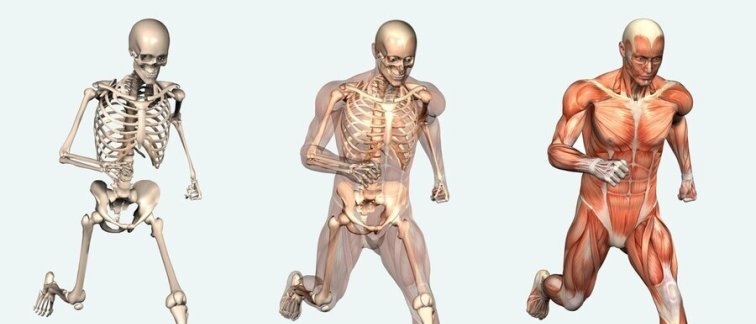The prevalence of musculoskeletal conditions increases with age, but also younger people are affected. In the 2016 The Global Burden of Disease (GBD) study showed that musculoskeletal conditions were the second highest contributor to global disability, and lower back pain remained the single leading cause of disability since it was first measured in 1990.
Overall aim
The overall aim of this program is to conduct high quality research in order to improve the physical performance, the activities of daily life and health related quality of life for people who suffer from musculoskeletal disorders
The research program Musculoskeletal Health (AMS-MSH (‘P2’)) conducts high-quality scientific research on the musculoskeletal system (muscles, bones, and tendons throughout the body), its relation with bio-psycho-social factors and its role in the onset or development of specific disorders. AMS-MSH research is primarily related to musculoskeletal disorders (for example within the field of orthopaedics, rheumatology, and physiotherapy). Still, also other disorders (for example within the field of neurology and oncology) that secondarily influence the musculoskeletal system fit within the scope of AMS-MSH.
AMS-MSH research is characterized by its translational character, as it links fundamental and applied research. By taking all relevant factors from the biological, psychological and social domain that possibly play a role in musculoskeletal health into account, AMS-MSH has a truly comprehensive bio-psycho-social perspective. AMS-MSH research covers the entire course of the disorder: from prevention to primary, secondary, and even tertiary care, which includes conservative (e.g., physiotherapy, lifestyle), pharmaceutical, and surgical interventions. Innovations such as new diagnostic tests (e.g., inflammatory and epigenetic markers), new treatment approaches (e.g., e-Health, virtual reality), and new analysis techniques (e.g., machine or deep learning) are topics of interest. Finally, AMS-MSH strives for close collaboration with clinical partners, patients, and private partners. For example, the Dutch Back Pain Consortium has been initiated to facilitate collaboration across knowledge institutes, patients, professionals, and private companies in the field of back pain research.
Research themes
AMS-MSH research has been subdivided into the following five research themes. The selection of these themes has been made during a process of multiple board meetings and feedback from researchers of the AMS MSH program. An overview of current AMS-MSH projects within each research theme can be found below.
1) Uncovering the pathophysiology of musculoskeletal disorders
What causes musculoskeletal disorders? What factors play a role in this? Within this theme, we do translational research in which we attempt to uncover the underlying pathophysiological mechanisms for the development or worsening of musculoskeletal disorders. These mechanisms can be generic or specific to one or a few conditions. Studies can be both fundamental (in laboratory) and applied/epidemiological.
2) Predicting and understanding the course of musculoskeletal disorders
Why do musculoskeletal disorders lead to lasting disability in one person, while the other person is free of symptoms within weeks? Within this theme, studies focus on measuring the course of musculoskeletal disorders and resulting disabilities, and the mechanisms behind that. Valid, reliable and feasible measurement instruments to understand and, if possible, predict the course of musculoskeletal disorders are also investigated in this theme. Research within this theme contributes to a better understanding of the prognosis of musculoskeletal disorders.
3) Developing and improving therapies for musculoskeletal disorders
What can be done to reduce symptoms and disabilities due to musculoskeletal disorders? Which treatments are effective in this regard, and how can they be applied in daily clinical practice? Research in this theme focuses on the working mechanisms of therapies, developing, evaluating and/or implementing new or existing therapies for musculoskeletal disorders, based on established mechanisms and prognostic factors. These therapies can be given in first-, second- or third-line care, and can involve pharmaceutical, other conservative (such as physiotherapy), or surgical interventions. We also study if timely, effective care within primary care can prevent expensive, risky medical interventions to make care more efficient and save costs.
4) Reducing societal impact of musculoskeletal disorders
How can we ensure that someone with musculoskeletal disorders can continue to work and pursue activities of daily life that are important to them? Within this theme, we investigate the impact of musculoskeletal disorders on the patient’s life (for example on work, sports, hobbies, and quality of life), based on established mechanisms and prognostic factors. In addition, we study the consequences that conditions have on society (such as medical costs and costs due to reduced work participation).
5) Preventing musculoskeletal disorders
Prevention is better than cure. In this theme, we assess whether musculoskeletal(-related) disorders can be prevented (i.e., primary prevention) or whether their impact can be mitigated (i.e., secondary prevention). We assess what mechanisms can be applied in prevention, with a central role for lifestyle and self-management.
Program board
- Professor dr. Wendy Scholten Peeters, Faculty of Behavioural and Movement Science, VU Amsterdam (Program director);
- Dr. Idsart Kingma, Faculty of Behavioural and Movement Sciences, VU Amsterdam (Program deputy director);
- Dr. Daphne van Embden, Amsterdam UMC, location AMC;
- Dr. Esther Maas, Faculty of Science, VU Amsterdam;
- Dr. Maarten Steinz, Research associate, Amsterdam UMC, location AMC;
- Dr. Arthur Kievit, Amsterdam UMC, location AMC;
- Cain Rutgers, MA-student, Amsterdam UMC, location VUmc.

